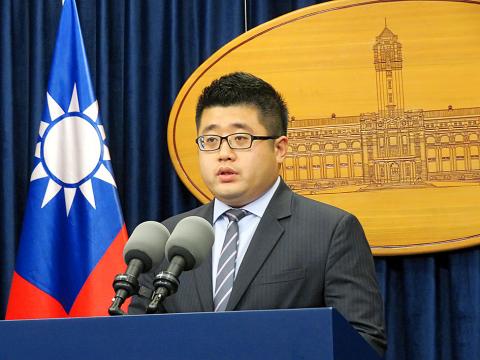The Presidential Office yesterday expressed gratitude to the US for its concern over China’s request to US and international airlines to change how they refer to Taiwan, while Washington’s action drew mixed response from others in Taiwan.
Taiwan would continue to support and strive for regional stability and cross-strait peace, despite Beijing’s constant efforts to suppress its international space, Presidential Office spokesman Sydney Lin (林鶴明) said.
The White House on Saturday issued a statement denouncing China’s demand that US and foreign airlines change how they identify Taiwan, Hong Kong and Macau on their Web sites.

Photo: Lee Hsin-fang, Taipei Times
The statement came after the Chinese Civil Aviation Administration on April 25 sent a letter to American Airlines, United Airlines and 24 other airlines, enjoining them to remove all descriptions of Taiwan as a country from their Web sites and promotional materials.
Ministry of Foreign Affairs spokesman Andrew Lee (李憲章) yesterday said China’s efforts to control private firms in other countries was “arbitrary and ill-intentioned.”
The international community must take the issue seriously and have the courage to defy such unreasonable demands, he said.
However, Chinese Nationalist Party (KMT) Legislator Lee Yen-hsiu (李彥秀) said that while it might appear that US President Donald Trump is defending the sovereignty of the Republic of China, anything Trump does has the US’ interests as his priority.
The US and China are competing against each other, and Taiwan could easily become the US’ chess piece, the lawmaker said.
Alexander Huang (黃介正), an associate professor at Tamkang University’s Graduate Institute of International Affairs and Strategic Studies, said that for the US, China asking US-based airlines to remove “Taiwan” from lists of countries is considered interference in its internal affairs.
“Eighty percent of the US’ reaction is due to the US’ consideration of itself as a great power and only 20 percent is a friendly gesture to Taiwan,” cable news channel TVBS quoted Huang as saying.
In related news, Josh Rogin, a columnist who covers foreign policy and national security for the Washington Post, Bloomberg and Foreign Policy magazine, in an online article on Saturday on the Post’s Web site said the Civil Aviation Administration’s letter “mischaracterizes US government policy by saying ‘the one-China policy of your government.’”
“The United States does not have a one-China policy. Washington acknowledges Beijing’s position that there is one China that includes Taiwan and the United States takes no stance on that question. The US government is not going to agree that Taiwan is part of the People’s Republic of China, and neither should American companies,” Rogin wrote.
“The Chinese Communist Party can be forgiven for believing it can use a version of its social credit system on American companies. Nobody has pushed back on this so far. The White House is pledging to start doing that now. It’s a recognition that, as a White House official told me, ‘China is out of control,’” Rogin wrote.

MAKING WAVES: China’s maritime militia could become a nontraditional threat in war, clogging up shipping lanes to prevent US or Japanese intervention, a report said About 1,900 Chinese ships flying flags of convenience and fishing vessels that participated in China’s military exercises around Taiwan last month and in January last year have been listed for monitoring, Coast Guard Administration (CGA) Deputy Director-General Hsieh Ching-chin (謝慶欽) said yesterday. Following amendments to the Commercial Port Act (商港法) and the Law of Ships (船舶法) last month, the CGA can designate possible berthing areas or deny ports of call for vessels suspected of loitering around areas where undersea cables can be accessed, Oceans Affairs Council Minister Kuan Bi-ling (管碧玲) said. The list of suspected ships, originally 300, had risen to about

DAREDEVIL: Honnold said it had always been a dream of his to climb Taipei 101, while a Netflix producer said the skyscraper was ‘a real icon of this country’ US climber Alex Honnold yesterday took on Taiwan’s tallest building, becoming the first person to scale Taipei 101 without a rope, harness or safety net. Hundreds of spectators gathered at the base of the 101-story skyscraper to watch Honnold, 40, embark on his daredevil feat, which was also broadcast live on Netflix. Dressed in a red T-shirt and yellow custom-made climbing shoes, Honnold swiftly moved up the southeast face of the glass and steel building. At one point, he stepped onto a platform midway up to wave down at fans and onlookers who were taking photos. People watching from inside

Japan’s strategic alliance with the US would collapse if Tokyo were to turn away from a conflict in Taiwan, Japanese Prime Minister Sanae Takaichi said yesterday, but distanced herself from previous comments that suggested a possible military response in such an event. Takaichi expressed her latest views on a nationally broadcast TV program late on Monday, where an opposition party leader criticized her for igniting tensions with China with the earlier remarks. Ties between Japan and China have sunk to the worst level in years after Takaichi said in November that a hypothetical Chinese attack on Taiwan could bring about a Japanese

The WHO ignored early COVID-19 warnings from Taiwan, US Deputy Secretary of Health and Human Services Jim O’Neill said on Friday, as part of justification for Washington withdrawing from the global health body. US Secretary of State Marco Rubio on Thursday said that the US was pulling out of the UN agency, as it failed to fulfill its responsibilities during the COVID-19 pandemic. The WHO “ignored early COVID warnings from Taiwan in 2019 by pretending Taiwan did not exist, O’Neill wrote on X on Friday, Taiwan time. “It ignored rigorous science and promoted lockdowns.” The US will “continue international coordination on infectious